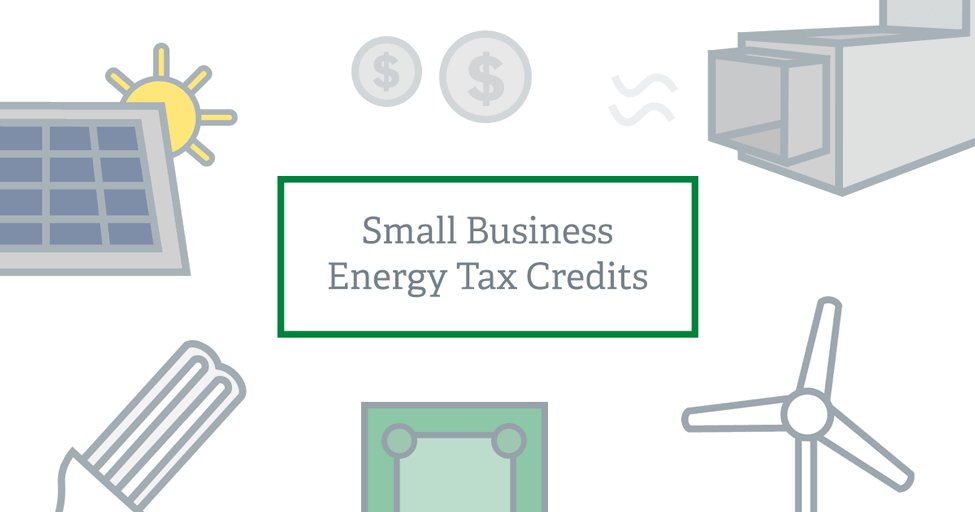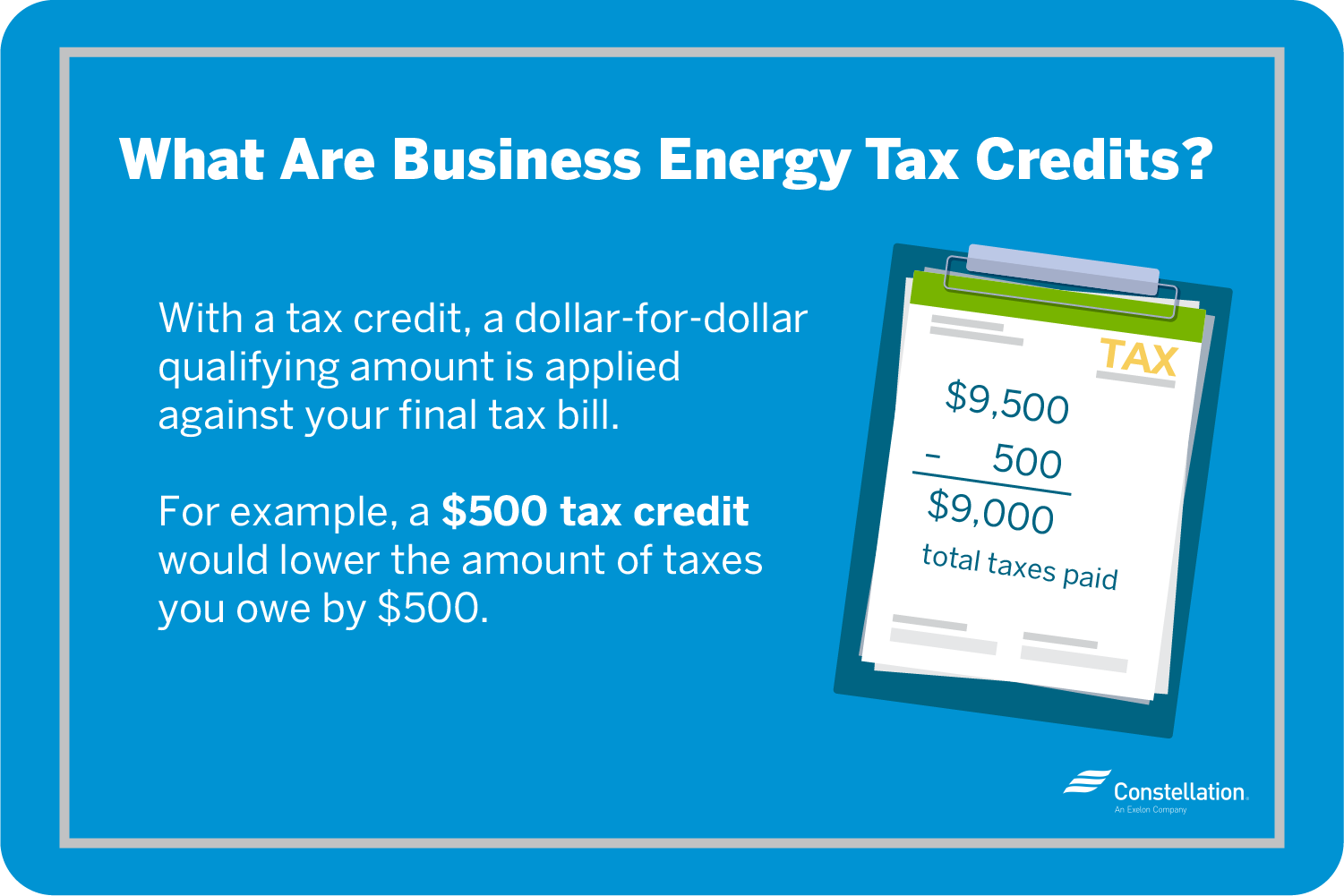
- Category:
Small Business Energy Savings - Published:
February 13, 2018 - Updated:
January 6, 2021
Finding Small-Business Energy Tax Credits for 2020-2021
Constellation has compiled the details below based on information available to us as of January 6, 2021, as a courtesy to your business. To the extent the below information raises other questions for you, we encourage you to work with your legal, tax and financial advisers.
Understanding energy tax credits
As a small-business owner, your mind is likely consumed with the day-to-day operations involved in turning a profit. Looking to the future is definitely part of that. But sometimes, we forget to manage parts of business that don’t affect the immediate cash flow.
You could be missing out on some financial opportunities if you haven’t explored business energy efficiency tax credits. Small-business energy credits are there for your benefit, and we’re going to help you find some that may help your bottom line.
What are business energy tax credits?
It’s important to understand how a tax credit is different from a tax deduction. With a tax credit, the qualifying amount is applied against your final tax bill. So, for example, a $500 tax credit would lower the amount of taxes you owe by $500. A $500 tax deduction, however, would only lower your taxable income by $500.

There are more benefits than simply getting some tax breaks. These incentives also limit how much energy your small business consumes and help you shift toward more environmentally friendly resources. Such benefits can be hard sometimes to put into concrete terms or assign a dollar value to, but they count in the long run — for both you and your community.
Note that some tax incentives expire on specific dates. Before you begin to explore retrofitting your space or making costly changes for the purpose of achieving business energy credits, it’s always a good idea to make sure those incentives are still available.
Where to look for small-business energy tax credits
If you’re searching for small-business energy tax credits, you could start with the U.S. Small Business Administration (SBA). The SBA offers a variety of federal tax credit IRS forms and documents that provide guidance for filing and eligibility. These include IRS forms for tax credits for home builders, manufacturers, commercial buildings and hybrid and alternative fuel vehicles.
You might be already familiar with the more common tax credits, like those from employer-provided child care or health care. But with business energy tax credits, your tax incentives are based on your energy efficiency. Here are some examples:
- Alternative Fuels Credit: If your business involves production of fuel (not consumption), you could be eligible for this credit based on the cost of producing alcohol-based fuels, like methanol and ethanol, and other alternative fuels, like biodiesel and renewable diesel.
- Alternative Motor Vehicle Credit: If you have company vehicles, you could apply for small-business energy tax credits of up to $8,000 by purchasing a vehicle with an alternative fuel source, namely one that uses hydrogen fuel cell technology. Hybrids and electric vehicles don’t qualify, since they use conventional fuels.
- Rehabilitation, Energy and Reforestation Investments Credit: You can get a credit up to 10% of your investment (limited to $10,000 per year) for investing in resources that preserve the environment. For example, if you spend money on reforestation or buy a building that requires restoration or reconstruction, you could take up to a 10% credit based on the cost of that work (which does not apply to new construction).
What qualifies for business energy tax credit?
You might be at the point where you’re interested in these incentives but you’re not sure about qualifying. Business energy credits are issued based on the carryforward of business credits from the prior year plus your total credits in the current year. You’ll need to file the form for the specific credit for which you’re applying, and if you’re applying for more than one, you’ll need to also file a Form 3800, or General Business Credit form.
To see if your business is qualifying for business energy tax credits, you should understand how it works. An energy credit is allowed for 10% of the cost of business property placed in service (i.e., becoming operational) during the tax year IF:
- The equipment uses solar energy to generate electricity, heat or cool a building, provide hot water or generate solar process heat.
- The equipment produces or distributes geothermal energy from rocks, water or steam.
- The property is depreciable and used in the course of your business.
Renewable energy tax credits are part of the business energy investment tax credit (Form 3468). So, if you sell or dispose of the property before the end of the recovery period, the credit would need to be repaid to the IRS.
You could be qualifying for business energy credits if you’re using these eligible technologies:
- Solar technology
- Fuel cells
- Small wind turbines
- Geothermal systems
- Microturbines
- Combined heat and power (CHP)
The tax credit is up to 26% for solar, fuel cells and small wind technologies in 2020, but goes down to 22% in 2021. Systems involving geothermal, microturbines and CHP will earn you a 10% tax credit in 2020 and 2021.
What tax credits are part of general business credit?
The more credits you take advantage of, the more you could be saving when it comes time to pay taxes. There are many options for business energy efficiency tax credits through the General Business Credit, including:
- Alternative Motor Vehicle Credit
- Alternative Fuel Vehicle Refueling Property Credit
- Low Sulfur Diesel Fuel Production Credit
- Qualified Plug-in Electric and Electric Vehicle Credit
- Renewable Electricity, Refined Coal, and Indian Coal Production Credit

Renewable-energy tax credits for businesses
If you’re looking for renewable-energy tax credits, the SBA can help with that, too. Tax credits are the government’s way of supporting the use of renewable resources. If you use electricity that comes from a source such as wind, geothermal, solar, hydro or biomass, you may be able to qualify for one or several energy efficiency tax credits for businesses. You’ll also be limiting the use of fossil fuels and other quickly depleting resources.
As a small-business owner, you might not be able to control the type of energy technology you use, especially if you’re renting office or industrial space. But if you purchase your own energy plan, you can buy green power for your space directly from your energy provider and take greater control over your commercial energy analytics.
If that’s not available to you, you could purchase a renewable energy certificate, or a “green tag.” Although it doesn’t provide renewable energy to your specific business, it shows your support of green resources. You can buy a green tag worth one megawatt-hour of renewable energy, or as many hours worth as you wish. You won’t just benefit the planet; the green tax credits for your business will also save you money come tax time.

Energy-efficient commercial building tax credit
If you’re the owner or lessee of a commercial building, you might qualify for an energy-efficient commercial building tax credit. This is granted when you incorporate high-energy systems like high-efficiency lighting, HVAC, hot water or other systems into your building. If your modifications achieve a 50% reduction in energy and power costs, you can deduct up to $1.80 per square foot for these areas. That’s why it’s always important to monitor your small business’s energy usage.
How to qualify for an energy-efficient building tax credit
Before you start to modify your existing building, it’s best to consult with an engineer. In order to apply for the credit, you need to have a certification that the 50% energy savings will be achieved. You could get a partial credit, or $0.60 per square foot, if you’re able to certify energy savings of 25% for interior lighting, 15% for HVAC and 10% for the building envelope, which is the walls, floors, windows, doors and roof that surround it. This green tax credit for businesses initially expired at the end of 2016, but it’s been retroactively extended through 2020.

Solar energy tax credits for businesses
A solar investment tax credit could provide a 22% to 30% tax credit for businesses that install, develop and finance solar energy property. Your actual credit amount will depend on when you start construction and put your equipment into service. Projects that begin in 2021, for example, will only be eligible for a 22% tax credit. If you start after 2021 or don’t have your equipment put in service by the end of 2023, the credit falls to 10%.
In order to qualify, you’ll need to provide the IRS with the cost of the system, when it became operational (or was placed in service) and a demonstration that it meets specific criteria. The U.S. Department of Energy and the Database of State Incentives for Renewables & Efficiency provide additional information on solar energy tax credits.
Getting the most out of your business energy efficiency tax credits
You want to do business at the lowest possible cost and with the highest possible income. Although not every one of these small-business energy tax credits might be right for your company, you might be able to find a few that are, and they may be able to help you stop wasting energy in your business.
These incentives are offered so you’ll take advantage of these opportunities to use renewable resources to power your businesses. Don’t miss out on a great opportunity — if you can get solar energy tax credits for business, or other renewable energy tax credits, do it today. Talk with your trusted advisers to see how energy efficiency programs for small businesses can make a difference for your bottom line.




